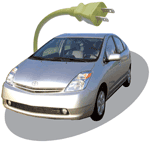Auto Industry EV-olution
 |
--What is the future of the automobile industry? Within a single century, personal transportation has progressed from horse-and-buggies to nearly one billion private automobiles. While our lives are unimaginable without cars, the vast majority of vehicles depend on oil, a problematic and limited natural resource that contributes to global warming. Against this environmentally unsustainable backdrop, America’s Big Three automakers have, for the past generation or more, shown a stubborn unwillingness to embrace innovation. Clearly, the time has come for change in the auto industry.
“Only one power alternative is readily available for automobiles today, and that is electricity,” says Dr. Robert Kang, Chairman and Chief Executive Officer of Leo Motors, Inc., a Korean-based company that, through its operating subsidiary, Leo Motors Co., Ltd., has introduced to the world a line of environmentally sound, cost efficient, and beautifully designed Electric Vehicles (EVs) and EV components.
“The EV industry has become one of the fastest growing businesses in the world,” Dr. Kang explains, “but high cost and performance barriers such as high voltage control, charging time, and limited range and speed, has thus far hampered the widespread acceptance and viability of electric cars.”
Leo believes that its patented multi motor system (MMS) remedies the problems that have long-plagued EVs. Using a combination of smaller motors, Leo’s MMS allows vehicles to operate from one low powered motor to four, depending on driving mode. The MMS holds the potential to become the standard EV technology for high performance highway driving and larger vehicles such as trucks and buses.
“In addition to using our technology in our own vehicles, Leo will market component parts to other EV and PHEV makers,” explains Dr. Kang. “With GM, Ford, Toyota, Honda, Nissan, Volvo, and Hyundai all having announced the imminent commercialization of Plug-in Hybrid Electric Vehicles, Leo is well positioned to become the international EV component supplier of choice.”
Along those lines, the company recently entered into an agreement with the city government of Puerto Princesa, Philippines, to supply 2,500 LSV taxis to the city in order to solve the region’s growing pollution and gas price problems with its existing tricycle taxis.
“If conventional combustion cars can be considered ‘analog’ technology,” says Dr. Kang, “EVs represent nothing less than the digital evolution of the automobile.” Visit www.leomotors.com to learn more.


